 W
WIn politics, campaign advertising is the use of an advertising campaign through the media to influence a political debate, and ultimately, voters. These ads are designed by political consultants and political campaign staff. Many countries restrict the use of broadcast media to broadcast political messaging. In the European Union, many countries do not permit paid-for TV or radio advertising for fear that wealthy groups will gain control of airtime, making fair play impossible and distorting the political debate in the process.
 W
WBaby kissing is a practice in which politicians and candidates campaigning for office kiss babies in order to garner public support.
 W
WA campaign bus is a bus used as both a vehicle and a center of operations during a political campaign, whether for a specific candidate, a political party, or a political cause. A campaign bus can also transport members of the press covering a candidate's campaign. In the UK, they are shared by reporters, political commentators and a politician, usually a party leader, to give them all access to each other as they traverse the country making speeches and other engagements during a general election campaign. In theory, the mutual advantage is that journalists get close access to politicians, and politicians can convey their message more directly to those reporting them. The modern use of campaign buses is often calculated to bring to mind whistle stop train tours that political candidates had historically used to reach large numbers of voters while campaigning by train.
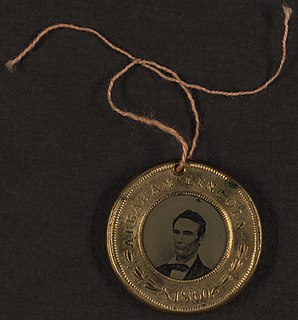 W
WA campaign button is a pin used during an election as political advertising for a candidate or political party, or to proclaim the issues that are part of the political platform. Political buttons date as far back as President George Washington. They have taken many forms as the technology to create an image and mass production has allowed. In the late 18th and first half of the 19th century they were sewn-on clothing buttons, whereas the modern forms typically have pins on the back and are therefore also called pin-back buttons.
 W
WCanvassing is the systematic initiation of direct contact with individuals, commonly used during political campaigns. Canvassing can be done for many reasons: political campaigning, grassroots fundraising, community awareness, membership drives, and more. Campaigners knock on doors to contact people personally. Canvassing is used by political parties and issue groups to identify supporters, persuade the undecided, and add voters to the voters list through voter registration, and it is central to get out the vote operations. It is the core element of what political campaigns call the ground game or field.
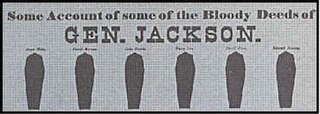 W
WThe Coffin Handbills were a series of pamphlets attacking Andrew Jackson during the 1828 United States presidential election. Jackson was running against incumbent John Quincy Adams. The campaign was very dirty, with multiple attacks on the character and personal history of both candidates. Many of the attacks were false.
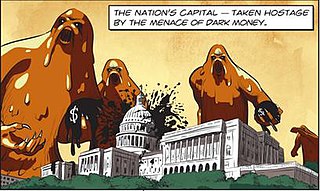 W
WIn the politics of the United States, dark money refers to political spending by nonprofit organizations — for example, 501(c)(4) 501(c)(5) (unions) and 501(c)(6) groups — that are not required to disclose their donors. Such organizations can receive unlimited donations from corporations, individuals and unions. In this way, their donors can spend funds to influence elections, without voters knowing where the money came from. Dark money first entered politics with Buckley v. Valeo (1976) when the United States Supreme Court laid out Eight Magic Words that define the difference between electioneering and issue advocacy.
 W
W"Get out the vote" or "getting out the vote" (GOTV) describes efforts aimed at increasing the voter turnout in elections. In countries that do not have or enforce compulsory voting, voter turnout can be low, sometimes even below a third of the eligible voter pool. GOTV efforts typically attempt to register voters, then get them to vote, by absentee ballot, early voting or election day voting. GOTV is generally not required for elections when there are effective compulsory voting systems in place, other than perhaps to register first time voters.
 W
WA Gevald campaign is a partisan Get out the vote campaign aimed at convincing voters that voting for a certain candidate or party is the only way to avert a certain catastrophe.
 W
WThe Ibiza affair, also known as Ibiza-gate, was a political scandal in Austria involving Heinz-Christian Strache, the former vice chancellor of Austria and leader of the Freedom Party (FPÖ), and Johann Gudenus, a deputy leader of the Freedom Party.
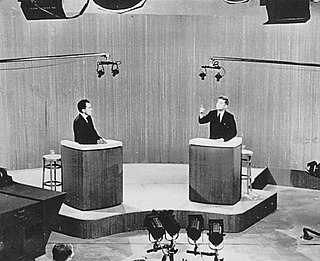 W
WA leaders' debate or presidential debate is a public debate held during a general election campaign, where the candidates expose their political opinions and public policy proposals, and criticism of them, to potential voters. They are normally broadcast live on radio, television and Internet. The events may be organized by media corporations or non-government organizations.
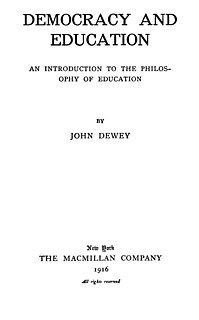 W
WA manifesto is a published declaration of the intentions, motives, or views of the issuer, be it an individual, group, political party or government. A manifesto usually accepts a previously published opinion or public consensus or promotes a new idea with prescriptive notions for carrying out changes the author believes should be made. It often is political or artistic in nature, but may present an individual's life stance. Manifestos relating to religious belief are generally referred to as creeds.
 W
WA campaign announcement is the formal public launch of a political campaign, often delivered in a speech by the candidate at a political rally.
 W
WThe She Spot: Why Women are the Market for Changing the World – And How to Reach Them is a 2008 non-fiction book by Lisa Witter and Lisa Chen.
 W
WWe Have A Right is a political campaign launched to protect personal freedoms in Bahrain by the society of liberal intellectuals, Al Muntada, on 22 November 2005.